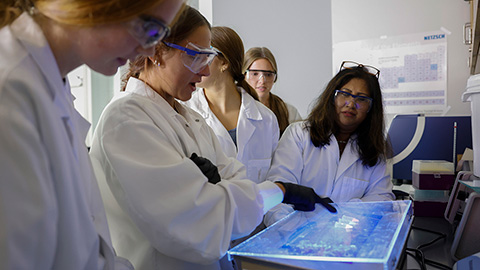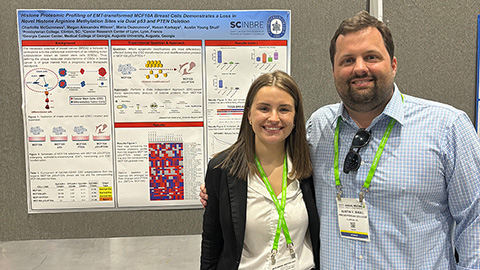Roundup: How can scientists help fight COVID-19?
The COVID-19 pandemic has many people asking, "What can I do to help?" Here, we round up a list of actions that research scientists can take. If you have a suggestion to add to the list, email us at asbmbtoday@asbmb.org.
Follow best practices for public health and safety
Flatten the curve. Wherever you live, follow recommendations from the Centers for Disease Control and Prevention and your local public health authorities about social distancing, telework, handwashing and canceling or postponing public gatherings to mitigate the spread of SARS-nCoV-2.
If you manage a team, 500 Women Scientists has collected tips for responsible teaching and mentoring during the epidemic.
If your lab works with animals, check this website from the National Institutes of Health’s Office of Laboratory Animal Welfare for guidance on dealing with emergencies that affect animal husbandry.
Help public health labs, hospitals and other facilities
You may have read that RNA extraction kits, required to perform diagnostic testing, are in short supply nationwide. Unfortunately, for regulatory reasons, clinical laboratories can’t fall back on other methods of RNA extraction. So, if you have viral RNA isolation kits on hand in your lab, there may be a diagnostic lab near you that would benefit from a donation.
According to scientists who have reached out to public health laboratories, the staff there are grateful for the help but have their hands full managing many aspects of this crisis, so here’s a list of local contacts who are already hard at work taking inventory of labs' potential donations. Email us at asbmbtoday@asbmb.org if you’re organizing donations in your region or to let us know about donation requests.
Anywhere
- The RNA Society is coordinating with public health officials to host a database of reagents that academic labs would be willing to donate. Click here to add reagents (and your location) to the list.
- In light of N95 and surgical mask shortages, many universities are organizing drives to collect surplus personal protective equipment for area medical facilities (of various types). Check with your campus administrators. Also see this list of donation sites.
California
- Bay Area: Graduate student Phil Frankino and colleagues at the University of California, Berkeley, are working on cataloging useful reagents and determing where they are most needed. You can add reagents to the database here.
Colorado
- Denver area researchers led by Jay Hesselberth at the University of Colorado Anschutz Medical Campus are taking inventory of Qiagen RNA extraction kits in the state.
Georgia
- Contact Nick Willett at Emory University to add RNA isolation reagents to a list of lab supplies in case of shortages.
Massachusetts
- Brigham and Women’s Hospital Clinical Laboratory put out a call for viral isolation kits. Read it here.
Washington
- The University of Washington's virology department has put out an urgent call for 1000uL MagNA Pure Tips.
- If you’re affiliated with the University of Washington School of Medicine, we’re told that the dean has reached out in search of volunteers to help staff the diagnostic laboratory there. (Update: Here's our story about this.)
Ways to contribute from the comfort of home
Sew masks — but only after doing some research. You don't have to have Christian Siriano-level sewing skills to make masks for local hospitals and other facilities. But don't start sewing before finding out exactly what they need. For example, St. Mary's Hospital in Madison, Wisconsin, asks that volunteers email before getting started, so that they can provide instructions. Also, some facilities are refusing such donations. Just do a little research first.
Provide transcription assistance. With the rush to transform brick-and-mortar classes into online courses, there's going to be a major need for captioning of lectures to ensure accessibility. We haven't heard of a clearinghouse for such volunteer work, but let us know if you do. In the meantime, check with the faculty in your life to see if you can pitch in.
Help the federal government contribute to R&D. The National Science Foundation and the Department of Energy are seeking input from the scientific community about how federal research facilities and finances can be used to address COVID-19. If you have relevant expertise, consider weighing in.
Help the public get informed. If you have expertise that could help the public, and at least 30 minutes a day: sign up as a volunteer to answer public COVID-19 questions through Ask a Scientist, a project of the Federation of American Scientists. Alternatively, you can volunteer to help the National Academies of Sciences, Engineering and Medicine improve its public health chatbot. Click here to sign up for a variety of roles on that project.
Skype a Scientist live sessions are a good way to practice outreach skills and help schoolchildren who are at home for the foreseeable future stay excited about learning. (It helps their parents, too!) Sign up here.
Help engineer solutions. The popular protein-folding game Foldit is running design puzzles to help researchers generate SARS-nCoV2-binding peptides. A UK-based publisher called Newspeak is collecting an open-source handbook listing projects contributing to telework, public information, and more. The chapter for scientists is of particular interest.
Enjoy reading ASBMB Today?
Become a member to receive the print edition four times a year and the digital edition monthly.
Learn moreGet the latest from ASBMB Today
Enter your email address, and we’ll send you a weekly email with recent articles, interviews and more.
Latest in Opinions
Opinions highlights or most popular articles

The tortoise wins: How slowing down saved my Ph.D.
Graduate student Amy Bounds reflects on how slowing down in the lab not only improved her relationship with work but also made her a more productive scientist.

How pediatric cataracts shaped my scientific journey
Undergraduate student Grace Jones shares how she transformed her childhood cataract diagnosis into a scientific purpose. She explores how biochemistry can bring a clearer vision to others, and how personal history can shape discovery.

Debugging my code and teaching with ChatGPT
AI tools like ChatGPT have changed the way an assistant professor teaches and does research. But, he asserts that real growth still comes from struggle, and educators must help students use AI wisely — as scaffolds, not shortcuts.

AI in the lab: The power of smarter questions
An assistant professor discusses AI's evolution from a buzzword to a trusted research partner. It helps streamline reviews, troubleshoot code, save time and spark ideas, but its success relies on combining AI with expertise and critical thinking.

How AlphaFold transformed my classroom into a research lab
A high school science teacher reflects on how AI-integrated technologies help her students ponder realistic research questions with hands-on learning.

Writing with AI turns chaos into clarity
Associate professor shares how generative AI, used as a creative whiteboard, helps scientists refine ideas, structure complexity and sharpen clarity — transforming the messy process of discovery into compelling science writing.


